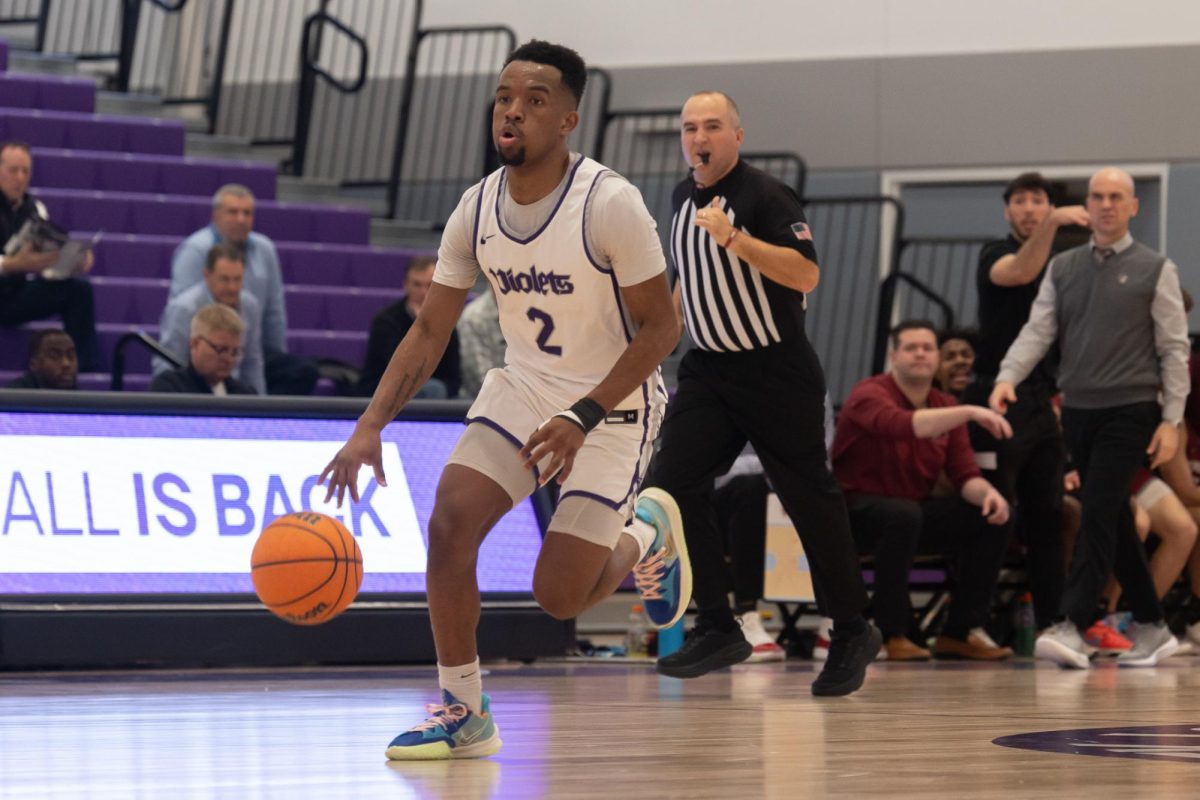Eighteen games into the 2024-25 season, the NYU men’s basketball team has a dominant 17-1 record and sits atop the UAA standings after a 77-62 win over Washington University in St. Louis on Sunday, Feb. 2, with sophomore Hampton Sanders scoring 19 points. While the Violets have emerged as a powerhouse this season, few players in Division-III basketball have experienced growth as drastic as Sanders.
Last season, the 5-foot-11 guard from New Jersey averaged 7.5 points per game while playing 17.3 minutes per game. This season he has continued to prove himself, as a cornerstone of NYU’s rotation, averaging 11.8 points per game.
“I feel like I’ve honestly just been able to have a little bit more freedom,” Sanders said in an interview with WSN. “Last year, playing behind Spencer (Freedman), I felt pretty limited in how I was able to impact the game. But this year, I’ve had more of a role to just go out and be more aggressive.”
That newfound aggression has translated into career-best numbers across the board. His three-point percentage has jumped nearly 15 percentage points, from 36.8% last season to 51.4% this year, making him one of the most efficient perimeter shooters in the UAA. Sanders has also been getting to the line at a much higher rate and leads NYU in free throw percentage — a critical factor in the Violets’ ability to close out tight games.
A smarter, more composed floor general
Beyond the numbers, Sanders’ command of the offense has been the biggest shift in his game. Last season, he struggled at times with decision-making, averaging 1.7 assists per game to 1.6 turnovers. Now, he’s doubled his assist total and is averaging 3.2 assists per game while cutting his turnovers down.
“I learned a lot from last year, watched a lot of film and just analyzed the things I wasn’t doing too well,” Sanders said. “This year, I’ve focused on taking the best shot possible — whether it’s me or my teammates — and hoping that philosophy helps us win games.”
This philosophy is key for Sanders as he uses his quick first dribble to break down defenders and attack the basket. He’s no longer just a spot-up shooter but is now a versatile offensive threat who can create his own shot, set up teammates and manipulate defenses with his quickness.
Leadership & mental growth
With the Violets boasting one of the deepest rosters in D-III, Sanders has embraced the challenge of being a leader in a competitive rotation.
“I think we have the most talented roster in the country,” Sanders said. “We’ve got six or seven guys who can get 15 to 20 points on any given night.”
That depth has allowed NYU to stay dominant even when key players have struggled, and Sanders’ ability to remain composed in high-pressure situations has been a game-changer. His growth isn’t just physical — it’s mental. After going through the first major slump of his basketball career last season, he has taken a more mindful approach to the game.
“Last year, I put a lot of pressure on myself, and I think that stress showed in my game,” Sanders said. “This season, I’ve taken a different approach — I’m just having fun, enjoying being on the court with my teammates, and embracing everything that basketball brings.”
From viral fame to college basketball: The Rod Wave Elite influence
Before NYU, Sanders played for Rod Wave Elite, a viral Amateur Athletic Union team that gained millions of views on social media. Playing alongside incredible talent, he had to adapt to a fast-paced, high-exposure environment that prepared him for the next level.
RWE was successful on and off the court during Sanders’ time, with viral social media accounts including the team’s owner, Cam Wilder’s 1.4 million Instagram followers. Wilder transferred virality to his players with social media features and shoutouts, and those followers have continued to support Sanders throughout his NYU career.
“Playing for Rod Wave Elite helped me realize how fun basketball can be,” Sanders said. “Being alongside some of the best players in the country with a ridiculous fan base was something I wanted to replicate. I played against everybody — from 7-foot big men to guys who could shoot from 40 feet out. It was a learning experience.”
Breaking barriers in NIL & mental health advocacy
Unlike D-I stars, most D-III athletes don’t have access to lucrative NIL deals, which allow student-athletes to make money off of their name, image and likeness — but that hasn’t stopped Sanders from finding creative ways to build his brand and make an impact.
“It started with me just reaching out to some brands I thought were cool,” Sanders said. “Some clothing companies sent me stuff, and eventually, a good friend of mine, Noah Kang, founder of Jerzey Sports Management, asked if he could represent me. Now, I’ve worked with brands like Hoop Culture and Incrediwear. It’s been a cool experience.”
Alongside his work in NIL, Sanders uses his platform to advocate for mental health awareness. After personal experiences in high school where he lost classmates to suicide, he launched his own apparel brand focused on promoting the importance of mental health awareness.
“I’ve had my own mental health challenges as I’ve grown up,” Sanders said. “I’ve dealt with anxiety, so I wanted people to know that not everybody who seems like they’re alright is alright, and that’s okay.”
What’s next for Sanders & NYU?
With the Violets ranking at the top of the UAA and Sanders playing the best basketball of his career, expectations for the remainder of the season are high.
“All I can hope for the rest of the season is winning,” Sanders said. “We’re a battle-tested team, playing good basketball, and I feel like we still have a lot left to show.”
If his rapid ascent this season is any sign, Sanders is only beginning to tap into his full potential.
Contact Brian Sanchez at [email protected]






















































































































































